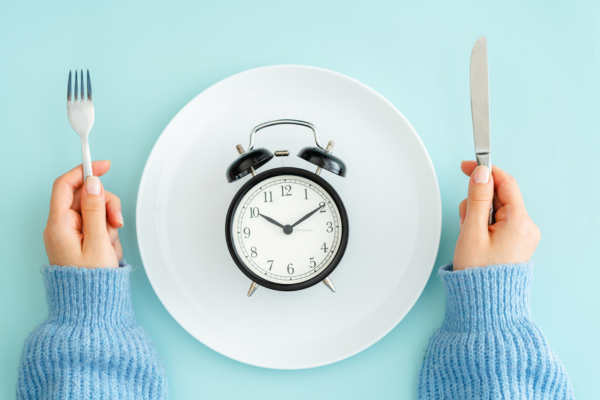If you’re cooking a late dinner or often feel snackish before bedtime, you may wonder, “Does eating at night make you gain weight?”
Short answer: When you eat is not as important as what you eat or how much you consume. Your body doesn’t store more fat at night, and your metabolism does not slow down in the evening hours.
“In general, there’s no set cutoff for eating food,” says Krista Maguire, R.D., C.S.S.D., senior nutrition manager for BODi. But you do still need to choose healthy snacks and be mindful of portions.
Before you reach for that midnight snack, here’s what you need to know about late-night eating and weight gain.
Busting the “Eating Late Causes Weight Gain” Myth

There’s a long-held belief that eating after a certain hour contributes to weight gain, but that may not be entirely accurate.
A 2011 study compared two groups of participants. One group followed a conventional weight-loss diet, while the other group consumed most of their carbohydrates at dinner.
The surprising results: Over the course of the six-month study, the group that ate the carb-heavy dinner reported greater weight loss and body fat mass reductions.
And more research suggests the “eat late, gain weight” adage applies to large quantities of food, but not to small meals consisting of nutrient-dense foods.
“If you’ve already consumed a large amount of food during the day, late-night eating may just be excess calories that could lead to weight gain,” Maguire says. “This is especially true if you’re consuming foods with no nutritional value — think potato chips, soda, or candy.”
But if you’re eating mindfully, Maguire adds, there can definitely be some benefits to eating at night.
A higher-protein snack with high-fiber carbs before bedtime may help reduce exercise-induced muscle soreness, prevent hunger pangs in the night, and possibly help with healthy blood sugar control.
Bottom line: “If you’re eating at night, don’t go about it mindlessly,” Maguire says. “Eat with purpose.”
Does Meal Timing Matter?

There are some potential benefits to planning your meals around when your body needs certain nutrients, a.k.a. timed nutrition. For example:
- Eating a healthy breakfast may keep you from feeling ravenous and overeating when lunchtime rolls around.
- A small pre-workout snack with 15 to 20 grams of carbohydrates — like half a banana — can give you the energy you need to power through a workout.
- Regularly timed meals throughout the day can help you maintain a healthy metabolism and energy levels.
To understand why eating late at night won’t automatically lead to weight gain, it’s important to understand how your body processes calories.
When you eat, your body works hard to convert food into the energy you need for everything from walking, thinking, breathing, building muscle, losing fat, and even sleeping. This process is known as the “thermic effect of food” (TEF).
Protein is the most metabolically expensive macronutrient — you burn up to 30 percent of the calories you eat from protein during the digestion process.
That’s one of the main reasons why protein (or taking a protein shake supplement) can be helpful for weight loss. The more protein you eat, the more calories you burn.
But there’s no clear link between meal timing and TEF.
So while you may have heard that eating first thing in the morning would lead to your metabolism working harder and burning more calories, the reality is that your body doesn’t care when or how often you eat — as long as you’re not adding excess calories.
So instead of wondering how many meals you should eat in a day and when to eat them, focus on what you’re eating and whether you’re being mindful of your portions.
Should You Eat at Night?

It depends on why you’re eating.
Many people eat at night out of boredom or because of stress or anxiety. Mindless eating and emotional eating can both turn a nighttime snack into a calorie bender.
Want a simple way to gauge whether or not you need that late-night grub?
“The true test of hunger is to ask, ‘If you could eat some veggies right now, would you?’” Maguire says. “If the answer is yes, you’re probably hungry.”
Otherwise, you may just be craving a snack or eating out of habit or boredom.
It’s also important to make sure late-night eating doesn’t interfere with your sleep habits.
Research suggests consuming carbohydrates at night may make it easier to fall asleep, but eating a big meal too close to bedtime may disrupt your sleep cycle and can lead to heartburn for some people.
That can ultimately get in the way of your weight loss goals.
Research suggests lack of sleep can torpedo weight loss by slowing your metabolism, increasing your appetite, and decreasing the number of calories you burn.
In a study at Wake Forest University, researchers found that people under 40 years of age who slept five hours or less each night gained nearly 2.5 times more abdominal fat than those who logged six to seven hours.
So if you’re a night eater, that’s fine — just make sure you’re choosing healthy foods, staying within your calorie goals for the day, and getting enough sleep each night.

